新人教版九年级英语unit4-知识点总结加练习及作文范文
新目标英语九年级Unit4-Unit5-Unit6知识点总复习和范文
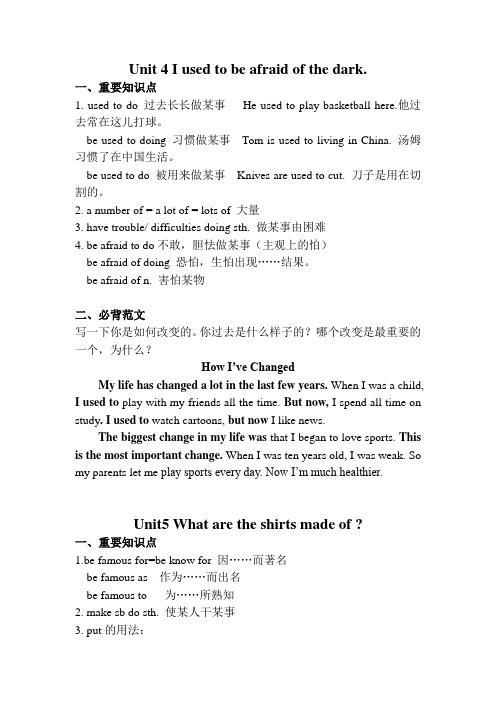
Unit 4 I used to be afraid of the dark.一、重要知识点1. used to do 过去长长做某事He used to play basketball here.他过去常在这儿打球。
be used to doing 习惯做某事Tom is used to living in China. 汤姆习惯了在中国生活。
be used to do 被用来做某事Knives are used to cut. 刀子是用在切割的。
2. a number of = a lot of = lots of 大量3. have trouble/ difficulties doing sth. 做某事由困难4. be afraid to do不敢,胆怯做某事(主观上的怕)be afraid of doing 恐怕,生怕出现……结果。
be afraid of n. 害怕某物二、必背范文写一下你是如何改变的。
你过去是什么样子的?哪个改变是最重要的一个,为什么?How I’ve ChangedMy life has changed a lot in the last few years. When I was a child, I used to play with my friends all the time. But now, I spend all time on study. I used to watch cartoons, but now I like news.The biggest change in my life was that I began to love sports. This is the most important change. When I was ten years old, I was weak. So my parents let me play sports every day. Now I’m much healthier.Unit5 What are the shirts made of ?一、重要知识点1.be famous for=be know for 因……而著名be famous as 作为……而出名be famous to 为……所熟知2. make sb do sth. 使某人干某事3. put的用法:Put on 穿上,put up 建造,put out 熄灭,put off 推迟,put down 放下,put away 收起来4. be allowed to do sth. 被允许做某事5. be covered with…被……覆盖二、重要语法:一般现在时的被动语态当主语为动作的执行者时, 谓语的形式为主动语态; 当主语为动作的承受者时, 谓语要用被动语态。
人教版九年级全一册英语Unit4单元语法知识点总结
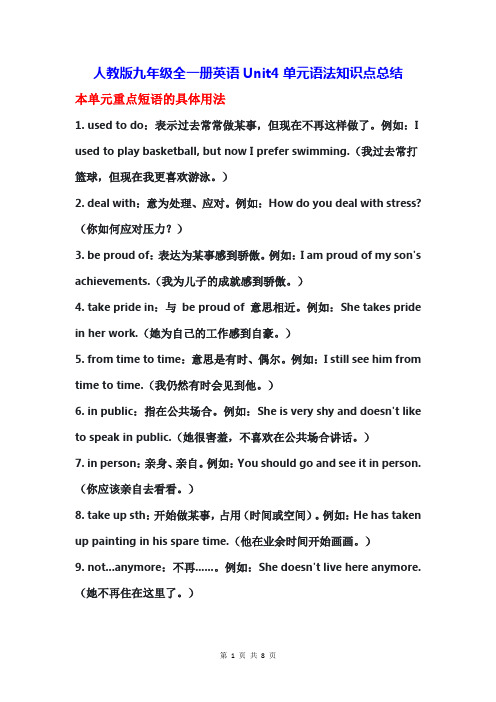
人教版九年级全一册英语Unit4单元语法知识点总结本单元重点短语的具体用法1. used to do:表示过去常常做某事,但现在不再这样做了。
例如:I used to play basketball, but now I prefer swimming.(我过去常打篮球,但现在我更喜欢游泳。
)2. deal with:意为处理、应对。
例如:How do you deal with stress?(你如何应对压力?)3. be proud of:表达为某事感到骄傲。
例如:I am proud of my son's achievements.(我为儿子的成就感到骄傲。
)4. take pride in:与be proud of 意思相近。
例如:She takes pride in her work.(她为自己的工作感到自豪。
)5. from time to time:意思是有时、偶尔。
例如:I still see him from time to time.(我仍然有时会见到他。
)6. in public:指在公共场合。
例如:She is very shy and doesn't like to speak in public.(她很害羞,不喜欢在公共场合讲话。
)7. in person:亲身、亲自。
例如:You should go and see it in person.(你应该亲自去看看。
)8. take up sth:开始做某事,占用(时间或空间)。
例如:He has taken up painting in his spare time.(他在业余时间开始画画。
)9. not...anymore:不再......。
例如:She doesn't live here anymore.(她不再住在这里了。
)10. worry about:担心、担忧。
例如:Don't worry about the exam, just do your best.(不要担心考试,尽力就好。
人教版九年级英语下册Unit 4 知识点总结+单元测试( 含答案)
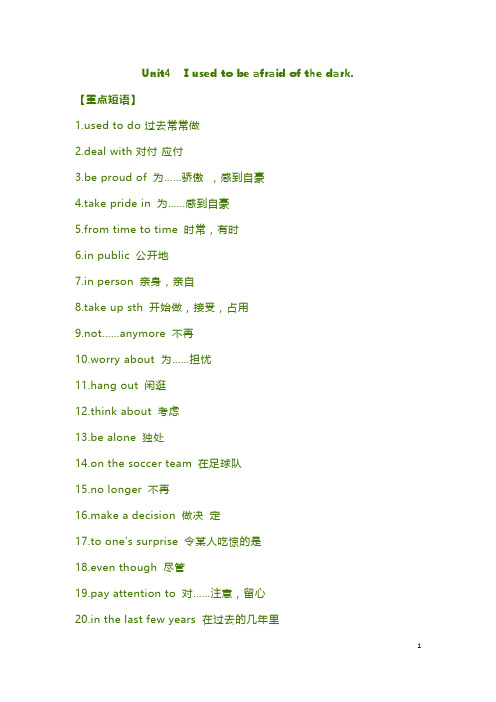
Unit4 I used to be afraid of the dark.【重点短语】ed to do 过去常常做2.deal with 对付应付3.be proud of 为……骄傲,感到自豪4.take pride in 为……感到自豪5.from time to time 时常,有时6.in public 公开地7.in person 亲身,亲自8.take up sth 开始做,接受,占用9.not……anymore 不再10.worry about 为……担忧11.hang out 闲逛12.think about 考虑13.be alone 独处14.on the soccer team 在足球队15.no longer 不再16.make a decision 做决定17.to one’s surprise 令某人吃惊的是18.even though 尽管19.pay attention to 对……注意,留心20.in the last few years 在过去的几年里21.be afraid of 害怕22.turn red 变红23.tons of attention 很多关注24.be careful 当心25.give up 放弃26.a very small number of …极少数的……27.give a speech 作演讲28.all the time 一直总是29.be interested in 对……感兴趣30.change one’s life 改变某人的生活31.take care of 照顾32.one of…, ……之一【重点句型】1. I used to be afraid of the dark.我过去常常前害怕黑暗.2.I go to sleep with my bedroom light on.我开着卧室的灯睡觉.3. I used to spend a lot of time playing games with my friends.以前我常常花很多时间和我的朋友们玩游戏.4. I hardly ever have time for concerts.我几乎没有时间去听音乐会.5. My life has changed a lot in the last few years.我的生活在过去几年里改变了很多.6. It will make you stressed out.那会使你紧张的.7. It seems that Yu Mei has changed a lot.玉梅似乎变化很大.Unit4单元测试卷笔试部分Ⅳ.单项选择16.______ the money that Mr Brown ______,poor Mary could go back to school again.A.In; offered B.With; offeredC.In; was offered D.With; was offered17.Don t worry!I m sure you ll ______your classmates if you are kind and friendly to them.A.catch up with B.agree withC.get on well with D.make friend with18.—What a hard problem!—Ask Mary.Maybe she has ______ with a good idea about it.A.come up B.ended upC.met up D.kept up19.—______ his car is broken?—He has to walk there.A.What if B.What aboutC.Do you know D.Even though20.—Each year, ______ fishes are killed by the polluted water and many people are made sick by the polluted air.—So we should do something to stop it!A.millions of B.million ofC.two millions of D.two millions21.We should have ______ in ourselves and we will make it if we have a try. A.success B.confidenceC.progress D.knowledge22.There are ______ books on the shelf.A.plenty of B.a lotC.a plenty of D.a good many of23.Miss Yang always helps others.She is very ______.A.careful B.gratefulC.useful D.helpful24.The rest of the students ______ not allowed to leave the classroom at that time.A.are B.haveC.was D.were25.I ______ read some good books than watch a bad TV program.A.would rather B.would likeC.had better D.prefer toⅤ.完形填空Everyone needs friends.We all like to feel close to someone.__26__is nice to have a friend to talk, laugh, and do things with.__27__,sometimes we need to be alone.We don t always want people around.But we would feel lonely if we __28__had a friend.No two people are just the same.Friends__29__don t get on well.That doesn t mean that they no longer like __30__.Most of the time they will make up and become__31__again.Sometimes friends move away.Then we feelvery__32__.We miss them very much, but we can call them and write to them.It could be that we would even see them again.And we can __33__new friends.It is surprising to find out how much we like new people when we get to know them.There s more good news for people who have friends.They live longer than people who don t.Why?It could be that they are__34__.Being happy helps you stay well.So remember to bring happiness to your friends in turn.If someone cares about you, you should take__35__care of him or her.26.A.It B.He C.There D.Someone27.A.Hardly B.Nearly C.Suddenly D.Certainly28.A.ever B.never C.just D.really29.A.always B.sometimes C.often D.usually30.A.each other B.others C.the others D.another31.A.friendly B.good C.pleased D.friends32.A.angry B.sad C.happy D.alone33.A.look for B.find C.make D.know34.A.happier B.stronger C.kinder D.richer35.A.less B.better C.little D.noⅥ.阅读理解AIt was a wet and stormy night.The small gentlelooking man who had come into the inn was drenched (湿透) to the skin.He made his way to the fireplace but there were several villagers warming themselves in front of the fire and he could not go near it.As he stood there, the landlord who knew him slightly welcomed him and asked him why he was looking so sad.“I have lost a purse with twenty gold florins (一种叫做弗罗林的货币) in it,” said the man.“Where did you lose it?” asked the landlord as the men who had been standing in front of the fire gathered around them.“Within a mile of this place, I m sure,” said the man.“I ll go in search of it early in the morning.Nobody is likely to travel by that road in this weather and the purse will certainly be there till morning.”“If I were you...” began the landlord.“Yes, yes, what would you have done?” interrupted (打断) the man.“But come, let us warm ourselves by the fire.See, everybody has left!Where do you think all of them could have gone in this bad weather?”“If I were you,” said the landlord, grinning, “I would have become a story writer!”36.One stormy night, a small gentlelooking man ______.A.came into the innB.could go near the fireC.lost his purseD.looked for his purse37.The gentlelooking man could not go near the fire because ______. A.several villagers were in front of the fireB.the landlord stopped himC.he made his way to other placesD.he could not walk38.The villagers______after they heard the conversation between the man and the landlord.A.became story writersB.went home togetherC.gathered around themD.went in search of the purse39.The word “grin” probably means “______”.A.低声地哭 B.气愤地说C.露齿而笑 D.大声地唱40.According to the passage, which of the following is NOT true?A.The landlord knew the small gentlelooking man.B.The landlord became a story writer at last.C.It was wet and stormy that night.D.In fact, the gentlelooking man didn t lose his nurse.BWelcome to Tonglin Hotel.We will offer you the best service, so that you can have a pleasant stay here.Room Service:You can use room service 24 hours a day.Phone the Information Desk, and your message will be passed on to the room waiter.Dining Room:You can have three meals a day in the dining room.Breakfast is offered from 8:00 am to 9:30 am.Also the room waiter may bring breakfast to your room at any time after 7:00 am.If you need breakfast, please fill out a card and hang it outside your door before 6:00 am.Lunch is from 12:00 to 2:00 pm.Dinner is from 6:30 pm to 8:30 pm.Telephones:To make a phone call, you should dial (拨号) “0” for the Information Desk to put you through to the room waiter.There are also public telephones near the Information Desk.Tell the Information Desk if calls are needed.Shop:The hotel shop is open from 9:00 am to 5:30 pm.Coffee House:You can drink coffee here at the following times:12:00 2:00 pm8:00 pm 1:30 amOther Services:There is a cinema in the hotel.Films begin at 7:00 pm on Sundays and Wednesdays.Hot water is offered 24 hours a day.There is also a big swimming pool in the hotel.You can enjoy yourself at any time you like.It is free.41.You would see this notice______.A.in a hotel shopB.in a bedroom of a large hotelC.in a hotel dining roomD.on the door of a small hotel42.What would you do if you want room service at night?A.Fill out a card.B.Phone the room waiter.C.Go to the Information Desk.D.Phone the Information Desk.43.If you want to have your breakfast at a quarter past seven, youshould______.A.phone the Information DeskB.go to the hotel dining roomC.go to the coffee house to have itD.put a message outside your room before 6:00 am44.If you want to have two hours talk in the coffee house, you may gothere at______.A.1:00 pm B.12:30 pmC.10:00 pm D.11:30am45.The notice tells us that we can______.A.see a film whenever we want toB.go to the coffee house once a weekC.go shopping at any time in the hotelD.swim in the pool without paying moneyCZhang Hongying, girl, 15I want to make our lunch time longer.At the moment, lunch time is short.Most of myclassmates would like to do their homework during this time.But if they don t get a go od rest, they won t have enough energy for the afternoon.So I would like to have more time so that we can take a nap after lunch.That way, we ll learn better in the afterno on.Zhao Pengran, girl, 15I would like to have more chances to talk in English.Now, the English classes are not enough for us to practice speaking English.I think we d better have one morning a week at least to have spoken English lessons in order to improve our English.Zhou Jiancheng, boy, 15My idea would be to have more fashionable school uniforms.If I were the headmaster, I would ask the students to design the uniforms themselves.We could have a contest am ong student designers.Then, we could ask others to choose their favorite.This way, we ll be able to wear what we like best.How nice it would be for us young people!以上为某学校通过校长意见箱收集到的一些学生的意见和建议。
Unit4单元知识点汇总 人教版英语九年级全册
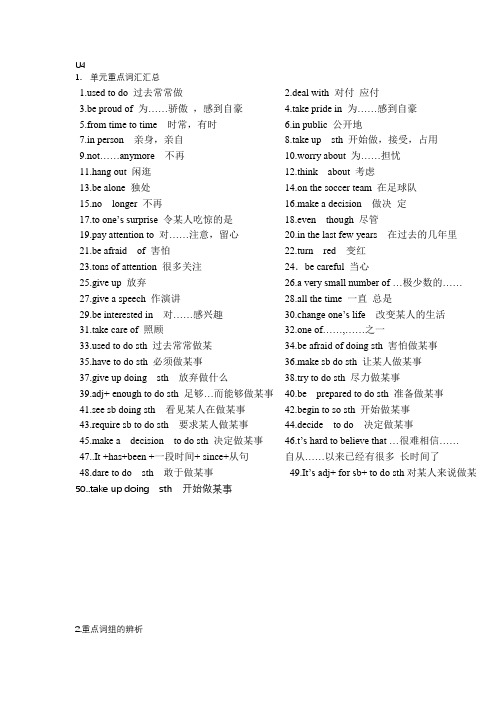
U41.单元重点词汇汇总ed to do 过去常常做2.deal with 对付应付3.be proud of 为……骄傲,感到自豪4.take pride in 为……感到自豪5.from time to time 时常,有时6.in public 公开地7.in person 亲身,亲自8.take up sth 开始做,接受,占用9.not……anymore 不再10.worry about 为……担忧11.hang out 闲逛12.think about 考虑13.be alone 独处14.on the soccer team 在足球队15.no longer 不再16.make a decision 做决定17.to one’s surprise 令某人吃惊的是18.even though 尽管19.pay attention to 对……注意,留心20.in the last few years 在过去的几年里21.be afraid of 害怕22.turn red 变红23.tons of attention 很多关注24.be careful 当心25.give up 放弃26.a very small number of …极少数的……27.give a speech 作演讲28.all the time 一直总是29.be interested in 对……感兴趣30.change one’s life 改变某人的生活31.take care of 照顾32.one of……,……之一ed to do sth 过去常常做某34.be afraid of doing sth 害怕做某事35.have to do sth 必须做某事36.make sb do sth 让某人做某事37.give up doing sth 放弃做什么38.try to do sth 尽力做某事39.adj+ enough to do sth 足够…而能够做某事40.be prepared to do sth 准备做某事41.see sb doing sth 看见某人在做某事42.begin to so sth 开始做某事43.require sb to do sth 要求某人做某事44.decide to do 决定做某事45.make a decision to do sth 决定做某事46.t’s hard to believe that …很难相信……47..It +has+been +一段时间+ since+从句自从……以来已经有很多长时间了48.dare to do sth 敢于做某事49.It’s adj+ for sb+ to do sth对某人来说做某50..take up doing sth 开始做某事2.重点词组的辨析辨析:used to do sth. 过去常常做…get/be used to sth./doing sth. 现在习惯于…be used to do 被用于做…(被动语态)be used by 由(被)…使用(被动语态)be used as … 被当做…使用(被动语态)be used for doing 被用于做…(被动语态)例: I used to go to work by bus. Now I take a taxi.He used to be a problem boy. She used to be very shy.I’m used to drinking a cup of water after meal.He’s been used to living in the dormitory.A hammer is used to drive nails.This machine is used to clean the floor.The girl is being used as a servant in the house.A knife can be used for cutting bread.used to的用法“used to+动词原形”表示过去常常干某事,现在不在干了。
人教版英语九年级Unit4单元知识点归纳
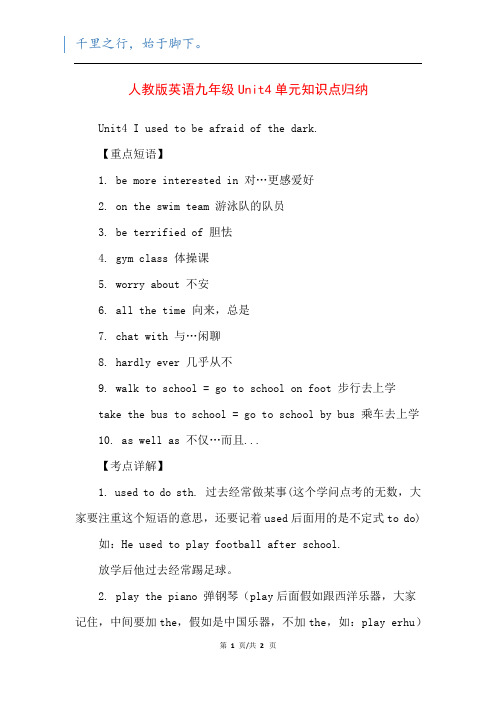
人教版英语九年级Unit4单元知识点归纳
Unit4 I used to be afraid of the dark.
【重点短语】
1. be more interested in 对…更感爱好
2. on the swim team 游泳队的队员
3. be terrified of 胆怯
4. gym class 体操课
5. worry about 不安
6. all the time 向来,总是
7. chat with 与…闲聊
8. hardly ever 几乎从不
9. walk to school = go to school on foot 步行去上学
take the bus to school = go to school by bus 乘车去上学
10. as well as 不仅…而且...
【考点详解】
1. used to do sth. 过去经常做某事(这个学问点考的无数,大家要注重这个短语的意思,还要记着used后面用的是不定式to do) 如:He used to play football after school.
放学后他过去经常踢足球。
2. play the piano 弹钢琴(play后面假如跟西洋乐器,大家
记住,中间要加the,假如是中国乐器,不加the,如:play erhu)。
人教版九年级英语第四单元知识点总结
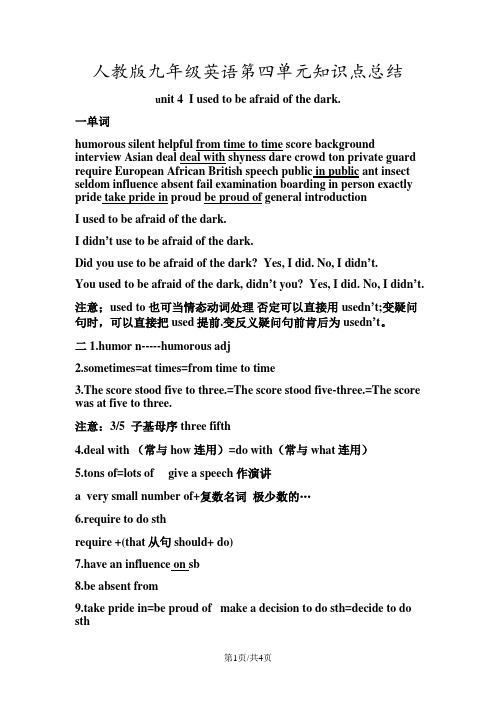
人教版九年级英语第四单元知识点总结u nit 4 I used to be afraid of the dark.一单词humorous silent helpful from time to time score background interview Asian deal deal with shyness dare crowd ton private guard require European African British speech public in public ant insect seldom influence absent fail examination boarding in person exactly pride take pride in proud be proud of general introductionI used to be afraid of the dark.I didn’t use to be afraid of the dark.Did you use to be afraid of the dark? Yes, I did. No, I didn’t.You used to be afraid of the dark, didn’t you? Yes, I did. No, I didn’t.注意;used to 也可当情态动词处理否定可以直接用usedn’t;变疑问句时,可以直接把used提前.变反义疑问句前肯后为usedn’t。
二1.humor n-----humorous adj2.sometimes=at times=from time to time3.The score stood five to three.=The score stood five-three.=The score was at five to three.注意:3/5 子基母序 three fifth4.deal with (常与how连用)=do with(常与what连用)5.tons of=lots of give a speech 作演讲a very small number of+复数名词极少数的…6.require to do sthrequire +(that从句 should+ do)7.have an influence on sb8.be absent from9.take pride in=be proud of make a decision to do sth=decide to do sthgive a general self-introduction fail the exam10.What’s sb like?(问外貌+性格)What does sb look like?(只问外貌)11.be on a swim team. get good grades on one’s exams12.such+a/an +adj+ n=so +adj +a/an+ n so+ adj/adv13.It has been three years since we last saw our primary school classmates.现在完成时标志词;since+时间点 for+ 时间段 in the last few years already yet ever so faruntil now recently these days/weeks/years注意:since后为一般过去时,主句用现在完成时have/has done ed to do sth 过去常常干某事be/get used to doing sth 习惯于干某事 be used to do sth=be used for doing sth 被用来做某事15.see/notice/ watch/look at/hear/listen to+ do(全过程)/ doing(正在做)16.take up1)从事,开始+doing sth He left a job in the city to take up farming.2)占据 The table takes up too much room.3)继续I put the telephone down and took up the work again.17.dare to do sth敢于做某事have to do sth 必须做某事(客观)=must do sth(主观)18.She is not shy anymore.=she is shy no more.not …anymore=no more(not置于be/助动词/情态动词之后)(no more通常置于句末)19.be able to=can能够 to one’s surprise令某人吃惊的是 to one’s +n pay attention to+ doing sth .....对做某事关注adj+ enough to do sth 足够…而能够做某事20.too much+ U/ too many+ C复太多的…..much too +adj 太….21.appear/disappear hang out with sbbe ready to do sth=prepare to do sth give up doing sth the roadto the successbooks on sth(关于….的书) at least/at mostwalk to school=go to school on foot wear the school uniforms all the timebe nervous about sth22.have difficulties/problems (in) doing sth23.cause problems另;使某人干某事 cause/get sb to do sth have/let/make sb do sth注意;变被动do要变成to do24.lonely 主观上孤单alone客观上一个人25.finally=at last=in the endbe afraid of doing sth=be terrified of doing sth=be afraid to do sth=be terrified to do sth26.advise sb to do sth/advise doing/advice that( shoud do)27.in person 亲自 even though=even if=although=though28.They are always thinking of me.be always doing sth常表达说话人的某种情绪。
人教版英语九年级上册Unit4知识点梳理及语法讲解
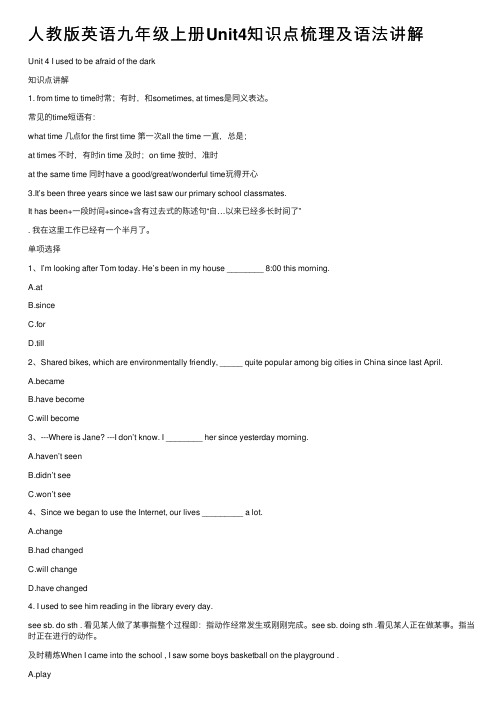
⼈教版英语九年级上册Unit4知识点梳理及语法讲解Unit 4 I used to be afraid of the dark知识点讲解1. from time to time时常;有时,和sometimes, at times是同义表达。
常见的time短语有:what time ⼏点for the first time 第⼀次all the time ⼀直,总是;at times 不时,有时in time 及时;on time 按时,准时at the same time 同时have a good/great/wonderful time玩得开⼼3.It’s been three years since we last saw our primary school classmates.It has been+⼀段时间+since+含有过去式的陈述句“⾃…以来已经多长时间了”. 我在这⾥⼯作已经有⼀个半⽉了。
单项选择1、I’m looking after Tom today. He’s been in my house ________ 8:00 this morning.A.atB.sinceC.forD.till2、Shared bikes, which are environmentally friendly, _____ quite popular among big cities in China since last April.A.becameB.have becomeC.will become3、---Where is Jane? ---I don’t know. I ________ her since yesterday morning.A.haven’t seenB.didn’t seeC.won’t see4、Since we began to use the Internet, our lives _________ a lot.A.changeB.had changedC.will changeD.have changed4. I used to see him reading in the library every day.see sb. do sth . 看见某⼈做了某事指整个过程即:指动作经常发⽣或刚刚完成。
人教版九年级英语月考复习:Unit 1-Unit 4 作文与高分范文汇编(word版)
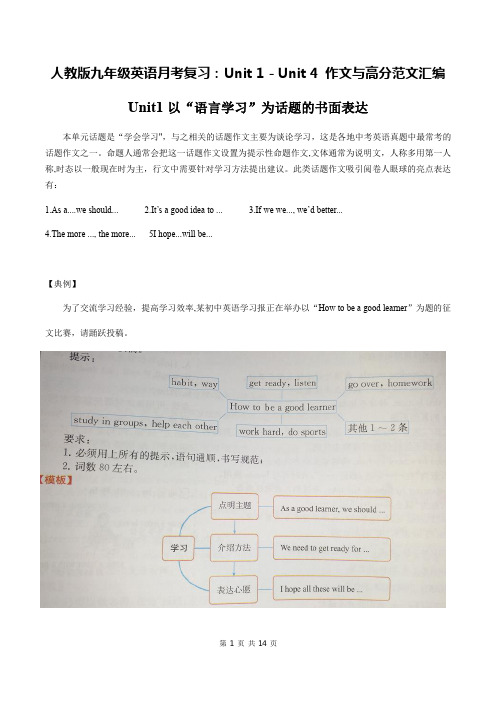
人教版九年级英语月考复习:Unit 1-Unit 4 作文与高分范文汇编Unit1以“语言学习”为话题的书面表达本单元话题是“学会学习",与之相关的话题作文主要为谈论学习,这是各地中考英语真题中最常考的话题作文之一。
命题人通常会把这一话题作文设置为提示性命题作文,文体通常为说明文,人称多用第一人称,时态以一般现在时为主,行文中需要针对学习方法提出建议。
此类话题作文吸引阅卷人眼球的亮点表达有:1.As a....we should...2.It’s a good idea to ...3.If we we..., we’d better...4.The more ..., the more... 5I hope...will be...【典例】为了交流学习经验,提高学习效率,某初中英语学习报正在举办以“How to be a good learner”为题的征文比赛,请踊跃投稿。
进入九年级以后,学习任务越来越艰巨,压力也越来越大。
有好多同学感到心烦意乱。
假如你比较擅长英语,请你根据自己的经验,向同学介绍几种学习方法,尤其是如何学好英语的方法。
要求:1.描述目前同学们的学习情况;2.介绍几条学习英语的方法;3.80~100 词左右。
【高分范文】Unit2以“节假日”为话题的书面表达【剖析】节假日”是我们经常接触到的话题之一。
本单元以“节日”为话题,主要围绕各种节日及其传统习俗展开,是大家较为熟悉的内容。
“就针对该话题的写作要求而言,通常要求我们写一篇文章,介绍某个节日。
常见的节日有圣诞节(Christmas Day)、感恩节(Thanksgiving Day)、母亲节(Mother’s Day)、父亲节(Father’s Day)、春节(Spring Festival)、中秋节(Mid-Autumn Festival)等。
随着对中国传统文化的重视,关于中国的一些传统节目的介绍成了最容易考的话题,如清明节(Tomb-Sweeping Day)或重阳节(the Double Ninth Festival)等。
- 1、下载文档前请自行甄别文档内容的完整性,平台不提供额外的编辑、内容补充、找答案等附加服务。
- 2、"仅部分预览"的文档,不可在线预览部分如存在完整性等问题,可反馈申请退款(可完整预览的文档不适用该条件!)。
- 3、如文档侵犯您的权益,请联系客服反馈,我们会尽快为您处理(人工客服工作时间:9:00-18:30)。
Unit 4 I used to be afraid of the dark? 短语、句型:1.for the first time 第一次2.What’s he like? = What does he look like?他长什么样?3.形容词/副词+enough to do sth.足够…可以做某事e.g. old enough to dress himself足够大可以自己穿衣服4.from time to time = at times = sometimes 有时5.all the time = always一直,总是6.[辨析]so和such,"那么”so+adj. +a /an+n.(单)---so beautiful a girl such+a /an+(adj.)+n.(单)---such a beautiful girl 7.take the bus to school = go to school by bus坐公交车去上学8.It has been +一段时间+since(后接时间点)自从…以来已经多长时间了9.get good scores/ grades 取得好成绩10.keep/ remain silent 保持沉默11.be helpful to sb./sth. 对…有帮助12.take up doing sth. 开始做某事13.deal with 应付;对付14.dare (to) do sth. 敢于做某事15.get tons of attention 受到极大关注16.in private 私下地in public 公开地17.in person 亲自;亲身18.be prepared to do sth. 准备好做某事19.require sb. to do sth. 要求某人做某事20. a number of 许多(谓语动词用复数)the number of …的数量(谓语动词用单数)21.give a speech 作演讲22.(seldom 不常,很少;hardly 几乎不;never从不等这些词视作否定词,用于反意疑问句时,附加问句应用肯定式。
)e.g. He seldom eats breakfast, does he?23.in the last /past few years在过去的几年里(用于现在完成时)24.have an influence on sb. 对某人有影响25.absent from 缺席,不在26.fail an exam 考试不及格27.advise sb. to do sth. 建议某人做某事advise doing sth. 建议做某事(注:advice为不可数名词)28.“数字+连字符+名词单数”构成复合形容词e.g. a 7-day holiday a 24-hour train29.in the end = at last = finally最后,终于30.even though = even if尽管,即使31.no more= no t… any more 不再32.take pride in = be proud of对…感到自豪33.cause problems惹麻烦34.fight on 坚持下去35.be there for sb. 支持某人;陪伴某人36.general introduction 总体介绍37.so+助动词/be/情态动词+主语(不同主语)该结构主要用来说明前面所说的情况也同样适用于后面的人或物,意思为“…也是如此”。
注:此句型只用于肯定句。
否定句:要用“neither/nor+助动词/be/情态动词+主语”表示“…也不是”e.g. —I like playing basketball. 我喜欢打篮球。
—So do I. (=I like playing basketball, too.)我也喜欢。
(第一句中的I与第二句中的I不是同一人)so+主语+ 助动词/be/情态动词该结构是对上文所说的情况加以肯定,表示:“的确如此”,“确实这样”。
e.g.—He likes playing basketball .—So he does. 确实是这样。
语法要点:ed to do sth.表示“过去常做某事”,只表示过去和现在对比,暗示现在不做了。
to为动词不定式,后接动词原形。
eg:He used to go to school at six o’clock.他过去常常六点去学校。
2. used to do sth.的否定形式:usedn’t to do sth.主语+ used not to do sth.didn’t use to do sth.eg; He used to watch TV all day.他过去常常整天看电视。
→He usedn’t to watch TV all day.=He didn’t used to watch TV all day.他过去不常常整天地看电视。
注意:usedn’t= used not3. used to do的一般疑问句形式及其答语:(1)Used+主语+to do...?回答:Yes,sb. used to./No,sb. usedn’t to.eg:Tom used to read books.→Used Tom to read books?Yes,he used to./No,he usedn’t to.(2) Did十主语+use to do...?回答:Yes,sb. did./No,sb. didn’teg:I used to do homework after school.→Did you use to do homework after school?Yes,I did. /No,I didn’t.ed to do的反意疑问句形式也有两种,类似于否定句形式。
eg:-They used to go to the concert on Sunday,usedn’t/didn’t they?一Yes,they used to./No,they usedn’t to.(一Yes,they did./No,they didn’t.)拓展:sb. get/be used to ( doing) sth.某人习惯于(干)某事;sth.be used to do sth.某物被用于做某事;be used for(doing) sth.被用于做某事;作文范例:How I’ve Changed!My life has changed a lot in the last few years. I used to be short and thin, but now I am taller and stronger. I had so much time in the past, but now I’m too busy. For example, I used to play every day after school. Now I just study all the time. I used to be afraid of tests, but now I don’t worry about them.The biggest change in my life was that I am not the shy girl anymore. I used to remain silent most of the time. But now I dare to speak in front of the whole class. This is the most important change because I study more active than before.练习:1. My brother used to play football after school. (改为一般疑问句并做否定回答)_______ your brother _____ _____ ____ football after school? No, he _____.2. His brother used to be a quiet boy.(改为否定句)His brother _______ _____ ______ ______ a quiet boy.3. There used to be an old hospital behind our school, _____ ______? 或 _____ ______? (反意疑问句)4. My dad required me (finish) my homework on time.5. He liked listening to music before, but now he doesn’t like it.(合并为一句)He ______ _____ _______ listening to music.6. He spent an hour in finishing reading the book.( 改为同义句)It ______ him an hour _____ _________reading the book.7. A number of students (be) planting trees on the hill.The number of students in our class (be) 40.8.They used to be on the soccer team. (改为否定句) They ________ ______ ______ be on the soccer team.9.They promised to take care of my dog. (改为同义句)They promised to ________ ________ my dog.10. He advised (leave) here early.11. She gets used to (have) breakfast.12. John never watches TV after school, (反意疑问句)13.Mary took up (learn) English at the age of 13.14. The little boy is brave enough (go) out alone at night.15. The mother takes pride in her son.(改为同义句)The mother her son.16. The wood was used to (make) fire.17. He used to be short. (改为一般疑问句并作肯定回答)18.Anna used to wear glasses. (改为否定句)或。
